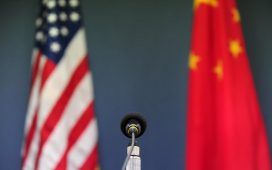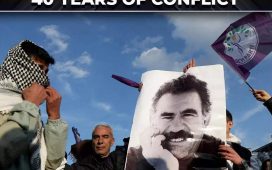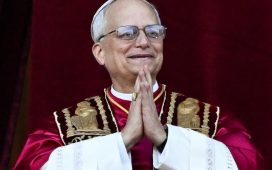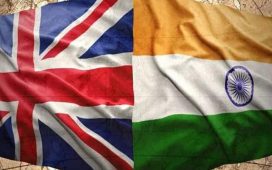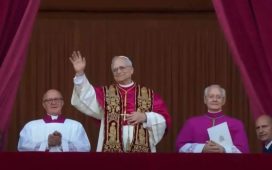
Almost immediately after a gunman shot at Trump from a nearby warehouse roof while he spoke at a rally in Butler, Pennsylvania, last weekend, the Secret Service faced accusations from Republicans and anonymous law enforcement officials that it had turned down requests for additional agents to secure Trump’s rallies.
“There’s an untrue assertion that a member of the former president’s team requested additional resources and that those were rebuffed,” Anthony Guglielmi, a spokesperson for the Secret Service, said last Sunday, the day after the shooting.
Alejandro Mayorkas, the secretary of the Department of Homeland Security, which oversees the Secret Service, said Monday that the accusation that he had issued the denials was “a baseless and irresponsible statement and it is one that is unequivocally false.”
On Saturday, Guglielmi acknowledged that the Secret Service had turned down some requests for additional federal security assets for Trump’s detail. Two people briefed on the matter, who spoke on condition of anonymity because they were not authorized to speak publicly, confirmed that the Trump campaign had been seeking additional resources for the better part of the time that Trump had been out of office. The denied requests for additional resources were not specifically for the rally in Butler, Guglielmi said.
U.S. officials previously said the Secret Service had enhanced security for the former president before the Butler rally because it had received information from U.S. intelligence agencies about a potential Iranian assassination plot against Trump. In a statement provided to The New York Times on Saturday, Guglielmi emphasized that the federal agency works in a “dynamic threat environment” and that, in the instances where the Secret Service could not provide additional resources, they supplemented security for Trump’s rallies with state and local law enforcement assets or changed its security plans to reduce Trump’s exposure. “In some instances where specific Secret Service specialized units or resources were not provided, the agency made modifications to ensure the security of the protectee,” Guglielmi said in the statement. “This may include utilizing state or local partners to provide specialized functions or otherwise identifying alternatives to reduce public exposure of a protectee.”
Guglielmi said the federal agency is limited in the amount of resources it can dispatch to events. Secret Service officials have for years complained that the agency is stretched thin, particularly during election season, when it must protect the sitting president, multiple candidates and political conventions.
The fact that the service might have rejected earlier requests for additional support was previously reported by The Washington Post.
The admission will only fuel the intense criticism that Secret Service Director Kimberly Cheatle is expected to face on Monday when she appears at a hearing with the House Committee on Oversight and Accountability.
The Secret Service had already been barraged with questions over why it had excluded from its security zone the warehouse — about 450 feet from the former president — from which the would-be assassin had fired at Trump on July 13. Trump, whose right ear was injured in the attack, could be seen touching his ear as popping noises went off, before dropping to the ground and being surrounded by Secret Service agents.
The service never held or took part in a public briefing the night of the shooting, while other law enforcement officials held a news conference a few hours after the fact. The service did not hold a public briefing to answer questions in the week after the assassination attempt.
The intensity of the anger between Republicans and top brass at the Washington-based Secret Service after the assassination attempt boiled over during the Republican National Convention. A group of senators chased Cheatle through Fiserv Forum in Milwaukee, saying she was not answering their questions about the shooting.
The Secret Service has faced scrutiny over the way it assigned local law enforcement officers to assist with security at the Butler rally. The agency tasked a sizable contingent of local law enforcement officers with working inside its security perimeter, rather than covering the building where the shooter ended up.
The would-be assassin was able to roam freely outside the perimeter before he took his position on the roof, even though local officers had noticed him acting oddly and notified other law enforcement.
The agency also faced questions as to why it had allowed Trump to take the stage at the Butler Farm Show grounds, even after receiving information that law enforcement was looking for someone suspicious in the crowd.
In addition to wounding Trump, the gunman, later identified as Thomas Matthew Crooks, 20, of Bethel Park, Pennsylvania, killed one rally attendee and injured two others. A Secret Service sniper then shot and killed Crooks. Mayorkas this past week called the incident a “failure” of security, and President Joe Biden has called for an independent review of the security procedures before and after the shooting.
Several Republicans have called on Cheatle to resign. During Trump’s speech at the convention, he commended the efforts of the agents who immediately rushed to his aid and brought him to safety.
A Trump campaign spokesperson declined to comment on the new revelations, pointing only to a post by Trump on Truth Social after the assassination attempt, in which the former president praised his Secret Service detail for protecting him.
“I want to thank The United States Secret Service, and all of Law Enforcement, for their rapid response on the shooting that just took place in Butler, Pennsylvania,” Trump wrote.
Nonetheless, the Trump political team has been concerned about the lack of support and additional resources for years, and those concerns have only become more acute as Trump has faced a series of unprecedented situations for a former president, including four criminal arraignments.
A consistent source of stress, according to a campaign official, who spoke on condition of anonymity because they were not authorized to speak publicly, has been the lack of sufficient metal detectors to screen attendees. At one rally for Trump at a park in New York City at the end of May, the official said, the lack of detectors led to a logjam of people waiting to get in.
But service officials were more concerned, the official said, with matters like limiting the number of picnic tables that people could stand on. In another stark example, the official said, the service initially denied a request by the Trump team for metal detectors when the former president attended his youngest son’s high school graduation in May, saying it wasn’t a “political” event. Ultimately, the service relented.
And, at Trump’s massive outdoor rally earlier that month in the town of Wildwood, New Jersey, on the Jersey Shore, a request by the Trump team for specially trained dogs to search the area was denied, the official said.
Often, the official said, the requests were denied in a phone call from service officials, rather than put in writing.
The Secret Service has been battered by controversies for many years. They include one in November 2009, when a Washington couple crashed a state dinner at the White House. Two years later, a man with a semiautomatic rifle fired at the White House from a car parked in front of it, while President Barack Obama’s younger daughter Sasha was at home and his other daughter, Malia, was en route to the building. A service supervisor thought the noise had been a backfiring car and told officers they should stand down.
Last year, an intoxicated man was able to evade the security detail of Biden’s national security adviser, Jake Sullivan, and enter his home at 3 a.m. Sullivan, who confronted the intruder and made him leave, was not harmed in the breach.
Even how to guard the Republican National Convention site was a source of dispute between convention officials and the Secret Service. Convention officials repeatedly pressed the service to change the area where protests were allowed, fearing clashes between protesters and delegates. The argument lasted for weeks.
The Secret Service ended up designating the convention as a National Special Security Event, a protocol usually used for large-scale functions, including the United Nations General Assembly. The designation allowed the service to pull in additional federal resources.

